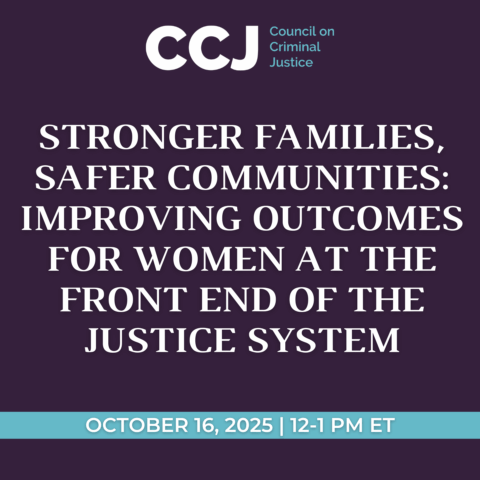Led by two former defense secretaries, CCJ commission calls for creation of a national center to advance best practices for justice-involved veterans and coordinate support
EMBARGOED FOR RELEASE
5:00 a.m. ET, March 2, 2023
Contact: Tania Stewart
tstewart@mrss.com
864-356-1320
WASHINGTON, D.C. – America’s civilian justice system fails to adequately identify veterans, steer them away from prosecution and incarceration, and coordinate or research the effectiveness of programs attempting to support them, the Council on Criminal Justice (CCJ) Veterans Justice Commission said in releasing its first set of recommendations today.
While data-based tools exist to verify a person’s veteran status, only 9 of the nation’s 18,000 law enforcement agencies and 11% of its 3,100 jails report using them, relying instead on veterans to self-identify, the Commission said. But many veterans fail to do so because of shame or fear of losing benefits. Hundreds of jurisdictions now operate specialized Veterans Treatment Courts (VTCs), but participation is often restricted to minor offenses, and just 36 of 2,300 prosecutors’ offices reported operating veteran-specific diversion programs. As a result of these and other holes in the system, veterans miss out on diversion opportunities or treatment targeting the service-related trauma and other conditions that often drive their criminal behavior.
The Commission, which is led by former Defense Secretary and U.S. Senator Chuck Hagel and includes former Defense Secretary and White House Chief of Staff Leon Panetta, issued three recommendations to address these and other challenges confronting veterans at the “front end” of the criminal justice system, from arrest through sentencing:
- To improve identification of veterans when they come in contact with the justice system, Congress should authorize a study to evaluate the effectiveness of databases that capture veteran status, order necessary improvements, and incentivize their use by local and state agencies. Addressing a related problem, the Commission urged Congress and state legislatures to codify a uniform definition of the term “veteran.” As detailed in a report to the Commission, the federal government, states, criminal justice agencies, and community programs all differ in the specific criteria they use to determine who is, and who isn’t, a veteran, creating confusion and barriers to services.
- States and the federal government should pass laws expanding or creating opportunities for veterans to avoid prosecution, conviction, or incarceration if they complete programs, including VTCs, requiring them to take responsibility for their actions and address issues underlying their criminal offending. The Commission also said courts should be permitted to consider combat exposure and other military experiences a mitigating factor at sentencing, including in cases involving violence.
- Noting that reliable data on justice-involved veterans is sorely lacking, the Commission recommended that the federal government establish a National Center on Veterans Justice to fund research and identify effective program interventions. The center also would facilitate coordination among the tens of thousands of veteran support groups in the U.S.; while many are doing commendable work, the Commission found that duplication of effort, lack of structured connectivity, and sporadic adoption of best practices hamper their potential broad-scale impacts.
“These recommendations are a call to action,” said Hagel, the only Vietnam veteran and the first enlisted combat veteran to have served as Secretary of Defense. “Too many veterans are ending up in our criminal justice system, and while they must be held accountable for their behavior, our nation has a responsibility to honor their service and help them address the factors that often drive them to break the law.”
The Commission has found that one in three of the nation’s 19 million veterans report having been arrested at least once in their lifetime, and at last count, an estimated 181,500 veterans were incarcerated in local, state, or federal facilities. Former service members make up nearly 8% of those in state prisons and 5% of the federal prison population.
CCJ launched the two-year Commission in August 2022 to assess the extent and nature of veterans’ justice-system involvement, the adequacy of support for service members as they return home, and the effectiveness of the system response when veterans break the law. In addition to Hagel and Panetta, Commission members include a former Sergeant Major of the Marine Corps, the chief justice of the Georgia Supreme Court, two formerly incarcerated veterans, and other top military, veterans, and criminal justice leaders.
“While there have been innovations and improvements in how we manage and support justice-involved veterans in recent years, the situation, frankly, remains appalling,” said Panetta, who also is a U.S. Army veteran and a former Congressman. “We can and must do better for the men and women who put their lives at risk to serve our nation.”
The report released today, Honoring Service, Advancing Safety: Supporting Veterans From Arrest Through Sentencing, is the first of three the Commission plans to produce. Subsequent recommendations will examine problems veterans face during their transition from military to civilian life and challenges at the “back end” of the justice system, from incarceration through reentry.
Support for the Veterans Justice Commission comes from The Arthur M. Blank Family Foundation, the Just Trust, the National Football League, Craig Newmark Philanthropies, T. Denny Sanford, Southern Company Foundation, and the Wilf Family Foundations as well as the John D. and Catherine T. MacArthur Foundation, #StartSmall, and other CCJ general operating contributors.
Members of the CCJ Veteran’s Justice Commission include:
- Hon. Chuck Hagel (Chair), 24th Secretary of Defense (2013-15), U.S. Department of Defense; U.S. Senator (Nebraska) 1997-2009
- Chief Justice Michael P. Boggs, Supreme Court of Georgia
- Carla Bugg, Criminal Justice Services Coordinator, Recovery Organization of Support Specialists
- Dr. Andrea Finlay, Ph.D., Research Health Scientist, Veterans Administration Center for Innovation to Implementation (liaison)
- Pelicia Hall, Senior Vice President, ViaPath Technologies; former Commissioner, Mississippi Department of Corrections
- Greg Hamilton, Chief Customer Officer, CIVICTEC; Sheriff, Travis County, TX (ret.)
- Maj. Gen. Mark Inch, United States Army (ret.); former director, Federal Bureau of Prisons; former Secretary of Corrections, FL
- Sgt. Maj. Alford McMichael, 14th Sergeant Major, United States Marine Corps (ret.)
- Gen. Maryanne Miller, United States Air Force (ret.)
- Justice Eileen C. Moore, Associate Justice, 4th District Court of Appeal, CA; Army Nurse Corps, U.S. Army
- Hon. Leon Panetta, 23rd Secretary of Defense (2011-13), U.S. Department of Defense; former White House Chief of Staff; CIA Director; OMB Director ; U.S. Congressman (California)
- Master Chief Petty Officer Vincent W. Patton III, Ed.D., Senior Vice President for Leadership Development, NewDay USA; United States Coast Guard (ret.)
- Maj. Gen. Angela Salinas, Chief Executive Officer, Girl Scouts of Southwest Texas; U.S. Marine Corps (ret.)
- Dr. Ronald Self, Ph.D., Director, Veterans Healing Veterans from the Inside Out
- Dr. Jo Sornborger, Psy.D.; Executive Director, Operation Mend, UCLA Health
- Gen. Peter Chiarelli, Vice Chief of Staff, U.S. Army (ret.); Member, CCJ Board of Trustees (senior adviser)
About the Council on Criminal Justice
The Council on Criminal Justice (CCJ) is a nonpartisan invitational membership organization and think tank that advances understanding of the criminal justice policy challenges facing the nation and builds consensus for solutions based on facts, evidence, and fundamental principles of justice.
Other CCJ task forces have addressed federal criminal justice priorities, COVID-19 and criminal justice, policing, violence reduction, and Medicaid and reentry. A commission focused on the extent and nature of military veterans’ involvement in the criminal justice system was launched in August 2022. To learn more, visit counciloncj.org.




